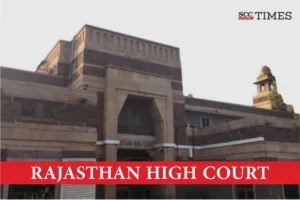Rajasthan High Court: In a writ petition by an employee under the State of Rajasthan, who is denied salary since 2016, despite actively rendering services, a single-judge bench of Anoop Kumar Dhand, J., held that withholding salary amounts to exploitation and violation of fundamental rights under Articles 21 and 23 of Constitution of India. The Court ordered the respondents to pay the salary promptly, failing which strict action, including contempt proceedings, would follow.
“Non-payment of salary to an employee amounts to depriving him of his livelihood. Such person cannot be allowed to starve at the hands of the authorities without any justified reason.”
In the instant matter, the petitioner, an employee of the State Government, was not paid salary since 2016. The Rajasthan Civil Services Appellate Tribunal, Jaipur, vide order dated 09-09-2021, directed the respondents to release the petitioner’s due salary. Despite the Tribunal’s order, the petitioner did not receive any payment.
The petitioner approached the High Court, which issued notices to the respondents on 16-02-2024 and directed them to consider the non-payment issue and pass appropriate orders. More than a year later, the respondents still failed to release the salary.
The petitioner contended that the right to livelihood is an essential part of the right to life under Article 21 and the continued withholding of salary despite the petitioner’s services amounts to forced labor and exploitation. It was contended that Article 23 prohibits Begar, and non-payment of salary for services rendered falls within its scope. It was contended that the respondents have defied the orders of the Tribunal and the High Court. However, the respondents contended that the petitioner failed to complete required formalities, and the salary could not be processed without the necessary documentation.
The Court noted that the respondents continued to avail the petitioner’s services while denying him his rightful salary. The Court rejected the argument that the petitioner did not fill out forms and stated that the authorities failed to provide any documentary evidence to support their claim that the petitioner was asked to complete formalities.
“The right to livelihood is an integral part of the right to life guaranteed under Article 21 of the Constitution of India.”
The Court reaffirmed that salary is essential for survival, and denying salary amounts to depriving an individual of their right to life. The Court asserted that the State cannot delay salary payments on procedural grounds when work has been continuously taken from the petitioner.
“Payment of salary or pension to the employees is only to eke out their livelihood during their service by way of salary and after retirement by way of pension. If, whole or part of the salary or pension is deferred, it amounts to denial of right to life guaranteed under Article 21 of the Constitution of India.”
The Court stated that the right to live with human dignity, free from exploitation is enshrined in Article 21 and derives its life breadth from the Directive Principles of State Policy and particularly Articles 39(e), 39(f), 41 and 42, and therefore, “it must include the right to live with human dignity, the right to take any action which will deprive a person of enjoyment of basic right to live with dignity as an integral part of the constitutional right guaranteed under Article 21.”
The Court stated that “Begar” means forcing someone to work without proper remuneration. The Court held that deliberate non-payment of substantial salary without justification constitutes forced labour, which is prohibited under Article 23. The Court referred to Maneka Gandhi v. Union of India, (1978) 1 SCC 248 and Olga Tellis v. Bombay Municipal Corpn., (1985) 3 SCC 545, where the Supreme Court recognised the right to livelihood as a fundamental right.
The Court asserted that the State’s non-compliance with the Tribunal’s order dated 09-09-2021 and the High Court’s notice dated 16-02-2024 shows the blatant disregard for judicial authority. The Court emphasised that public authorities cannot use bureaucratic excuses to violate an employee’s fundamental rights. The Court held that such procedural excuses cannot be used to deny an employee’s rightful wages.
“Fundamental Rights cannot be waived by any person and, therefore, by no stretch of imagination it can be said that mere not filing certain forms and completing the requisite formalities delay in filing the petition amounts to waiver of the right to get salary. No employer can be permitted to deprive the employees of their rightful salaries, that too month after month.”
The Court held that non- payment of salary for 97 months constitutes a violation of Articles 21, 23, and 300-A of the Constitution of India.
The Court directed the respondents are directed to release the petitioner’s due salary within one month and failure to comply will lead to contempt proceedings against senior officials, including, Secretary, Panchayati Raj Department, Rajasthan; Additional Chief Secretary, Department of Finance; Commissioner, State Insurance and Provident Fund Department and Director, Department of Pension. The Court further directed that if the order is not complied with, the Chief Secretary of Rajasthan is to withhold the salaries of the above officials. The Court listed the matter for compliance on 12-03-2025.
[Sunil Dattatrey v. State of Rajasthan, 2025 SCC OnLine Raj 361, Decided on 10-02-2025]
Advocates who appeared in this case :
Mr. Akshit Gupta and Ms. Pragya Seth, Counsel for the Petitioner
Ms. Sara Parveen on behalf of Mr. Kapil Prakash Mathur, AAG, Counsel for the Respondents

